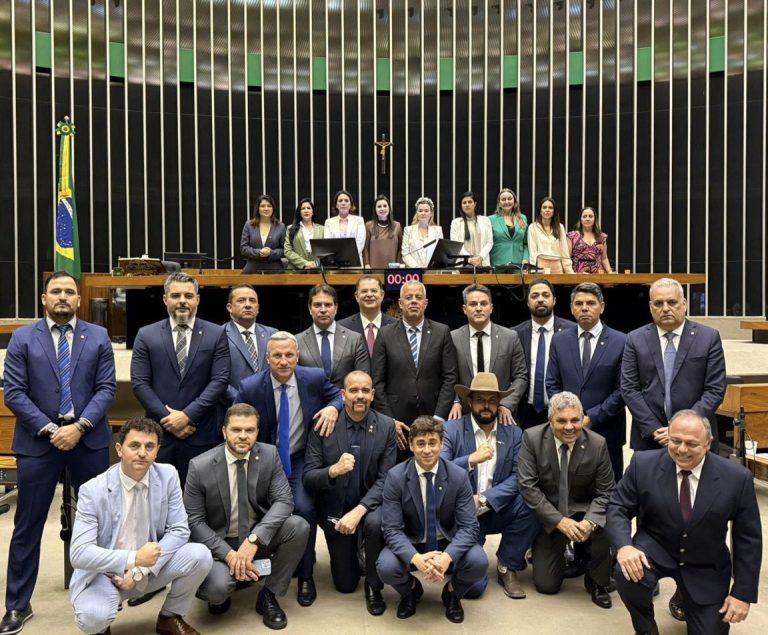Brazil’s Political Turmoil and the Path Forward
By Hotspotorlando News
In the heart of Brazil’s political arena, a storm is brewing that could redefine the nation’s democratic landscape. The recent actions by Deputy Marcel van Hattem and his allies, celebrating the cancellation of sessions in both the Chamber of Deputies and the Senate, mark a pivotal moment in the ongoing struggle against what many conservatives view as judicial overreach and authoritarian tendencies. This move, while a temporary victory, sets the stage for a broader battle that could either restore balance to Brazil’s institutions or plunge the country deeper into chaos.
The cancellation of these sessions, leading to a leaders’ meeting to discuss the agenda, is not merely a procedural win but a strategic maneuver. It signals a refusal to bow to the pressures exerted by the judiciary, particularly by Supreme Court Justice Alexandre de Moraes, whose recent decisions, including the house arrest of former President Jair Bolsonaro, have ignited a firestorm of controversy. For conservatives, this is a clarion call to defend the principles of liberty, limited government, and the rule of law against what they perceive as an encroaching judicial tyranny.
The demand for an amnesty, the end of privileged forums, and the impeachment of Moraes is not just a reaction to current events but a proactive stance to prevent future abuses. An amnesty would offer a path to reconciliation for those caught in the crosshairs of political persecution, restoring families and easing social tensions. Ending privileged forums would ensure that no one, regardless of position, is above the law, a cornerstone of any democratic society. However, the most audacious goal is the impeachment of Moraes, a move that, if successful, would be unprecedented in Brazilian history.
The path to Moraes’ impeachment is fraught with challenges. It begins with a citizen’s denunciation under the “Lei do Impeachment,” requiring a complex legal process that must navigate through the Senate. The approval of two-thirds of the Senate would mirror the impeachment process for a president, indicating a potential seismic shift in the balance of power. This could lead to several possibilities:
1. Restoration of Institutional Balance: If the impeachment process moves forward and succeeds, it could restore a check on judicial power, ensuring that no single branch of government dominates. This would be a victory for conservative principles, reinforcing the idea that power should be distributed and accountable.
2. Heightened Political Conflict: The attempt to impeach Moraes could exacerbate existing tensions, leading to a polarization that might destabilize the country further. Conservatives must be prepared for a backlash from those who view Moraes as a defender of democracy against what they perceive as Bolsonaro’s authoritarian legacy.
3. International Repercussions: The international community, already concerned with Brazil’s political stability, will watch closely. The recent U.S. sanctions against Moraes indicate that global powers are not indifferent to these developments. A successful impeachment could either strengthen Brazil’s position as a defender of democratic norms or isolate it further if perceived as a power grab.
4. Long-term Reform: Beyond the immediate goal of impeachment, this movement could catalyze broader reforms. Conservatives might push for constitutional amendments to limit judicial overreach, ensuring that future governments cannot wield the judiciary as a tool for political vendettas. This could include reforms to the appointment process of Supreme Court justices, making it more transparent and less susceptible to political influence.
The conservative vision for Brazil is one where liberty flourishes, where the government serves the people rather than oppresses them, and where the rule of law is upheld without exception. The current turmoil, while daunting, presents an opportunity to reset the course of the nation. It requires courage, unity, and a steadfast commitment to principles that have long been the bedrock of conservative thought.
As the leaders’ meeting approaches, the eyes of the nation—and indeed the world—will be on Brazil. The decisions made in the coming days could either mark the beginning of a restoration of order and liberty or a descent into further discord. For conservatives, the stakes have never been higher, and the path forward, though uncertain, is clear: defend the constitution, protect individual rights, and ensure that no one is above the law. The future of Brazil hangs in the balance, and it is a moment that demands resolve and vision.


